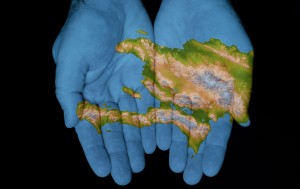Contributed by Jay Gamelin, pastor at Jacob’s Porch, a Lutheran campus mission to The Ohio State University, Columbus, Ohio
Warm-up Question
What are some rituals you do every day when you first get up; is there anything special you may do? Is there something you do every night before going to sleep? Where do these rituals come from?
We Shall Live!
When the two women were trapped under the rubble, all was darkness. The earthquake had flattened their university classroom in Haiti and the five floors above them were now on top of them. Only the light of one cell phone showed the situation. One woman had her leg trapped; the other had just a small pocket of space amid the rubble in which to move. The two women had shared a class and knew each other’s name. They became more than friends. They were companions through a terrible ordeal.
For six days they took turns yelling for help. When they heard voices they knew it was day. When the voices were gone they assumed it must be night. They had nothing to drink and just a few crumbs from a cookie to eat. But the two prayed, sang hymns, talked about boys, and rested when they could.
After six days, one woman said to the other, “We are not going to live.” The other encouraged her to hang on and have hope. She began talking about their life ahead. She spoke of the conversations they would have in a year, remembering this time together. Suddenly, the world changed. Light poured in and they were pulled out. Malnourished, feeble–but alive, they separated on the way to health stations, hoping to see one another again.
One year later, the women talk and reminisce about the horrific time in that small hole in the rubble. One woman is missing her leg; the other says she has nightmares. But they laugh when they meet. They still talk about boys. They remember that hope is what brought them through the valley of the shadow of death.
Discussion Questions
- Have you ever faced need and not able to get what you needed? If you have, how did this feel?
- If you have not, imagine what it would feel like to see others enjoying great wealth while you were hungry? What would you do to support your family? What if you were not able to do so?
Scripture Texts (NRSV) for Sunday, January 9, 2011 (Baptism of Our Lord)
(Text links are to Oremus Bible Browser. Oremus Bible Browser is not affiliated with or supported by the Evangelical Lutheran Church in America. You can find the calendar of readings for Year C at Lectionary Readings.)
For lectionary humor and insight, check the weekly comic Agnus Day.
Gospel Reflection
It is confusing: why would Jesus want to be baptized? This Jesus, who has done nothing but live righteously, comes to be baptized, to be “forgiven” of sins. Clearly John sees this is not the way it should be and tries to stop the event. But Jesus knows something about this holy moment. Jesus knows that he is pointing the world to a whole new reality. Jesus is becoming a model for what the rest of us are to do and be.
When Jesus was baptized, he did this to “fulfill all righteousness.” Typically this means to be righteous under the law. Jesus is following a “rule of faith” as a way of showing the rest of us what we are to do. As Jesus comes up from the water, a voice declares that he is righteous and beloved, a source of pleasure for the speaker. Jesus is made righteous. The law is no longer the rule but is fulfilled in baptism.
Often we think this is a voice for Jesus alone, but it expresses as much what God thinks of us as what God thinks of Jesus. When we are baptized, God is well pleased. This is done to forgive sins, to be sure, but it makes us family. We are made righteous. We are brought from death to life, just as Jesus was brought from death to life. Baptism binds us to God as Jesus was bound to God. It shows us that Jesus’ path of suffering and hope is our path also. Jesus becomes our companion in this journey, as do all who are baptized into God’s family.
The two women in Haiti were baptized by shared suffering into a relationship they had not expected, but it was being bound to one another that brought hope and life. They lived together through the dark and found one another in the light. Our baptism is about having a companion in our own darkness and knowing that light is coming.
Discussion Questions
- What is the darkest place you have ever been? What was it like in the darkness?
- Were you afraid of the dark as a child? What did you do when you were afraid? How did this help?
- Think of a dark time in your life. Who was there to be beside you? Who was a person that helped bring light to you when you felt the darkness?
- How was this person Jesus for you? What did this person’s actions tell you about how Jesus is at work in, through, and for you?
Activity Suggestion
“Though I walk in darkness…”
Materials: Bandanas, cloth, or other way to make blindfolds for half the group.
Break the group into pairs. Have each person in the pair take a turn being blindfolded and led by their partner. Explain to the group to take this exercise very seriously. You are to be trusted. Give the group a destination, perhaps to the sanctuary or other place that they must negotiate their way. Then the other person is led back to where you began. You can provide obstacles, or direct them to a tricky route to make the event more or less difficult as desired.
Process:
- Did you trust your partner? Why or why not? Were you surprised by anything they did or didn’t do?
- What was helpful about having a partner? How would this activity be different if you did not have a partner?
- Name some folks in your church who you think are a role model of faith. What is it about their walk that you admire? How are they helping you in your walk? What ways do they help “enlighten” (i.e. teach, show, help, provide an example) you when you feel like you are in the “dark?” (confused, not understanding, or being plain ole’ selfish)
Closing Prayer
God, we are your beloved and with us you are pleased. Thank you for all you give us to help us in our journey, especially the people who join us in baptism to be your children. Thank you for our role model, Jesus, who shows us the way. Thank you for the role models in our friends and church members who lighten the path. Hear us lift these role models up to you, aloud and in our hearts…. (allow time for names to be spoken or prayed for silently). Thank you for these partners in hope and light. We pray this in the name of our savior, Jesus. AMEN.



